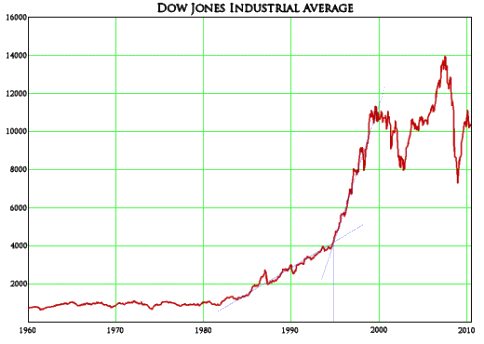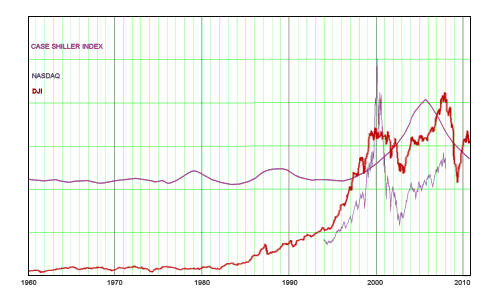


The reason I’m reviewing my personal experience is that it doesn’t fit with Robert Shiller’s speculations about how all of this happened. His notion of irrational exuberance fits the behavior of the professional Investors and Brokers – some kind of mass hysteria that occurs in a Bull Market. But it doesn’t fit me. I wasn’t blinded by excitement. If anything, most of the warning signs I just mentioned were more in the range of fear than exuberance. And, as it turned out, those fears were rational. But my rational fear never reached a level that alerted me to the future accurately.
In 1915, Sigmund Freud wrote a paper, The Unconscious. He was some twenty years into his theorizing about the mind, and he wanted to clarify what he meant by the term. It’s not a paper covered in survey courses about psychology or psychoanalysis – probably only read now by people in training or academics. Unlike the popular ideas, for Freud, the Unconscious was not a "place" in the mind filled with uncomfortable memories. Many of the pieces of an unconscious idea are accessible in some form always. What usually keeps things out of consciousness is the absence of "connections" between the pieces. The way it works is that if one connects the dots, one will feel painful emotions, so the mind defends against pain by keeping the various pieces from coming together into a complete story.
I think that’s what happened in my mind. Both of my parents were adolescents during the Great Depression, and my father was in a family who lived in particularly desperate straits during that period – gruesome stories, often told. So what I think happened in me was that my mind kept the various elements I mentioned above apart from each other, and particularly away from the dire circumstances I heard way too much about as a child. I acted on those fears, even though I never completely felt them. Now, I’m wondering if that same mechanism wasn’t true for a lot of people.
Post Traumatic Stress Disorder: Compulsive Blogging
There’s another psychological mental mechanism at work at least with me that deserves mention – post-traumatic thinking. The Great Recession occurred at a time in life when I’m retired and living on Social Security and the yield from investments – that period of life when people often talk about fixed income. I think the unexpected Great Recession was traumatic for me. Since the fall of the Stock Market in September 2008, many of my blog posts have been about economics, whereas I had little to say about that before then. People who have had traumatic experiences often go over and over the lead-up to the trauma. In a way, they seem to be trying to prevent the past – an obviously impossible task. One of the hallmarks of trauma is its unexpectedness. So the traumatized person’s mind keeps looking for how it might have been prevented, and is hypervigilant – scanning the horizon to keep it from happening again. My endless posts and perusal of economic indicators [I’d never looked at before in my life] bears clear testimony.
Post Traumatic Stress Disorder: the Tea Party
The part of the post traumatic syndrome we Liberals missed because we thought we had a bad government last time was the Tea Party Syndrome. One of the usual symptoms of P.T.S.D. [Post Traumatic Stress Disorder] is to have trauma specific fears. Right now, the very people who supported our last bad government are obsessed with having less government, less government spending, and lower taxes. Our problem was not enough govern-ment and bad govern-ment, but right now, those supporters are dead set anti-government types and irrational about it. Frankly, I think it’s a post-traumatic symptom and is unlikely to be altered by rational argument. Government hurts people and spends our money unwisely. Never-mind that it was their government that did both of those things.
Post Traumatic Stress Disorder: Epidemic Frugality
Most of us didn’t see it coming because we really knew nothing about how the system worked and weren’t in a position to be evaluating things. So, that is certainly true. We didn’t see it coming.
I still believe that — if I had been in a position to be paying attention and understood the system — I would have seen it coming, based simply on common sense understanding of the fact that, if the boom is based on making money out of losing money, it eventually has got to fail.
Aw shucks! I like psychologizing…
But you’re right, there’s no such thing as making money outside of a mint…
Damn, Nardo – at last, a plausible narrative that explains the etiology of the Tea Partiers! It certainly makes more sense that anything else I’ve heard, and it fits like a bespoke puzzle piece. It also accounts for the observable fact that their positions, driven by post-traumatic symptoms, are “unlikely to be altered by rational argument.â€
I told you once that I quite often get good and useful things from your blog, and this is a perfect example. In the words of our old friend Caspar Gutman, “By gad, sir . . . There’s never any telling what you’ll say or do next, except that it’s bound to be something astonishing.â€
I echo Woody’s comments about the value of Mickey’s blog. I can’t always get through all the graphs, but that’s all right. The commentary is well worth reading, always,